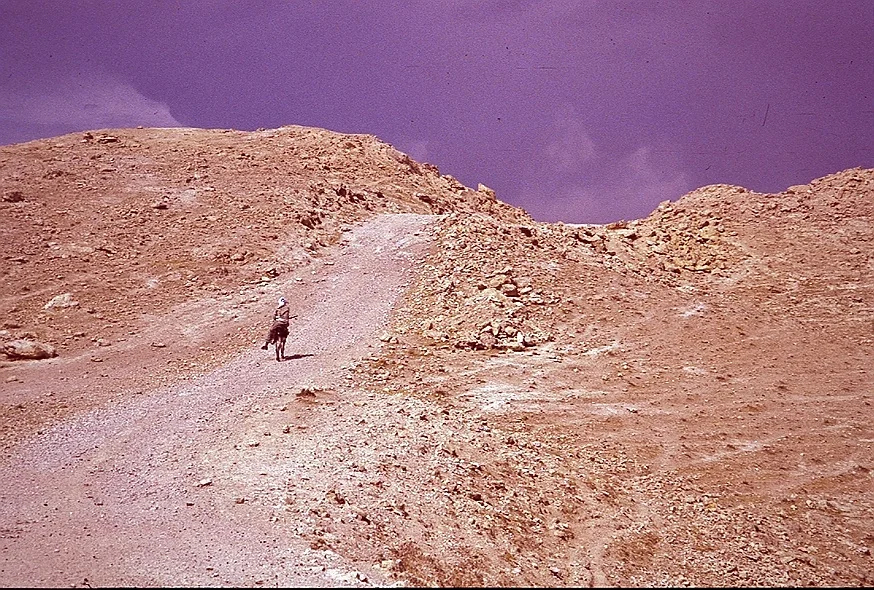Walking with the Desert Elders through Lent: An invitation
As a protestant from Florida, I did not discover the season of Lent until I was in college. Even then I did not understand it. All my experiences with giving things up were associated with punishment: go without dinner, not watch television, stay in my room, not go on the field trip etc. etc. These were not happy experiences. And all I learned from them was to avoid upsetting my mother. So I was not favorably inclined towards Lent. And since it was not my tradition, why get involved in something that, if you don't do it right, might get God upset at you? No, thank you.
I think I now have a better handle on why one might participate in Lent. In this retreat series of blog posts, I invite you to walk with some of the early Church athletes of giving things up – the Desert Elders, or Fathers and Mothers (or Abbas and Ammas). These men and women, mostly from Egypt and living in the Egyptian deserts, were famous throughout the Western world in the 4th and 5th century for the amazing lengths to which they would go in giving things up. They became a kind of spiritual tourist attraction. People from many lands would trek out into the desert from Alexandria to ask for "a word" that might enlighten, and then write back home where people would eagerly read about the miracles and words of wisdom of these desert hermits.
But we will not talk about their miracles, or their strange practices. (OK, just one: one Desert Father famous for his obedience spent 3 years watering a dry stick every day at the direction of his superior. At the end of this amazing act of perseverance, the stick bloomed into green leaves, rewarding his obedience. We will return to John the Dwarf in later postings to harvest some meaning from this story.) For now, we will instead try to understand some of their words of wisdom, and to understand why they felt giving things up was important to do.
The spiritual practice of giving things up is called asceticism, or ascesis. If you look these words up in a dictionary, you will usually find the phrase "self-discipline," and here we have the first clue to why the Desert Abbas and Ammas gave things up. It was to discipline or to deny the self. For me, discipline brings up those worrying anxieties I had in my youth of punishment for being bad. But we are dealing here with another meaning of the word. We say that some academic topic area is a "discipline." Or that someone is a disciplined musician or athlete. Or that a writer is self-disciplined.
All of these uses suggest we are talking about a practice or about practicing, and that it involves training the self in some way. In just what way is the question we need to answer. And answering this question will help us discover what Lent is for. Because Lent, and self-discipline, is surely done for-the-sake-of something, rather than simply being done for itself.
The first answer to this question is that asceticism, or denial of the self, is about a practice of keeping one's distance from the "false self." And keeping this distance from the many desires, and urges, and habits that we might deny ourselves in Lent is a way of cultivating our ability to turn away from the false self. As we learn how to do this, we may recognize the true self emerging, unencumbered by all of our previous attachments, and caring only about the most important things. In other words, we will be practicing humility, a virtue that is currently very unpopular in America. In both Western and Eastern church tradition, however, it has long been considered the queen of the virtues.
In other words, we will be practicing humility, a virtue that is currently very unpopular in America. In both Western and Eastern church tradition, however, it has long been considered the queen of the virtues.
There is a second answer, too, equally complicated and somewhat more mysterious. If the first answer is a purifying of the self, the obvious question is purifying for what? For the desert Elders, the purification of the self was the first step in contemplation of and communion with God. The first answer can be taken as primarily psychological (though it is surely rooted in a spiritual vision of the kind of creatures we are). And the second answer is unashamedly spiritual. The desert Elders were highly practiced in both, and some have written about both in ways that make them understandable even to beginners like me. We will sample some of that wisdom in this retreat.
An Invitation to Walking with the Desert Elders
The deep origins of Christianity are in the desert. It was an urban and pastoral culture on the edge of the desert into which Jesus was born. When he was baptized, Jesus was driven to walk into the desert for 40 days of fasting and reflection. The origins of monasticism came from Christians walking into the desert, away from the distractions and comfort of urban society. This Lent, we will be reflecting on the spiritual journeys and wisdom of those desert Elders. What knowledge can these gentle and severe extremists bring us for our own life journeys?
I invite you to come and reflect with me on what we might find. Beginning on Monday March 5, and ending on the Monday after Easter, with two posts a week (Monday and Saturday morning), we will look together at Lent and learn from the Desert Elders what Lent is for, and how we might best practice it. To learn more and to find the link to enroll you can click on the image above so you can be sure of getting the posts directly in your inbox.




